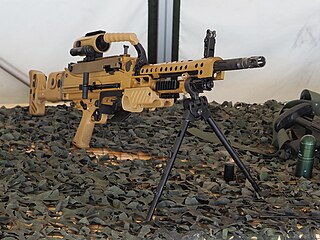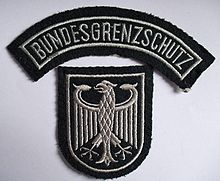
Conscription is the state-mandated enrollment of people in a national service, mainly a military service. Conscription dates back to antiquity and it continues in some countries to the present day under various names. The modern system of near-universal national conscription for young men dates to the French Revolution in the 1790s, where it became the basis of a very large and powerful military. Most European nations later copied the system in peacetime, so that men at a certain age would serve 1 to 8 years on active duty and then transfer to the reserve force.
GSG 9 der Bundespolizei, formerly Grenzschutzgruppe 9, is the police tactical unit of the German Federal Police (Bundespolizei). The unit is responsible for combatting terrorism and violent crime, including organized crime. In addition to its headquarters location in Sankt Augustin-Hangelar near Bonn, it also has a base in Berlin. Since 1 August 2017, it has been subordinate to the Federal Police Directorate 11. The state police (Landespolizei) maintain their own regional tactical units known as the Spezialeinsatzkommando (SEK).
Aid to the Civil Power (ACP) or Military Aid to the Civil Power (MACP) is the use of the armed forces in support of the civil authorities of a state. Different countries have varying policies regarding the relationship between their military and civil authorities.

The Bundeswehr is the armed forces of the Federal Republic of Germany. The Bundeswehr is divided into a military part and a civil part, the military part consisting of the German Army, the German Navy, the German Air Force, the Joint Support Service, the Joint Medical Service, and the Cyber and Information Domain Service.
The German Federal Coast Guard is a civilian law enforcement organisation whose primary missions are border protection, maritime environmental protection, shipping safety, fishery protection and customs enforcement. The Küstenwache is an association of several federal agencies, not a single entity like the United States Coast Guard.

The National People's Army were the armed forces of the German Democratic Republic (GDR) from 1956 to 1990.

Military service is service by an individual or group in an army or other militia, air forces, and naval forces, whether as a chosen job (volunteer) or as a result of an involuntary draft (conscription).

Bundesgrenzschutz is the former name of the German Bundespolizei. Established on 16 March 1951 as a subordinate agency of the Federal Ministry of the Interior, the BGS originally was primarily focused on protecting the West German borders. During their early days, BGS units had military structures, training and equipment. The law enforcement officers legally had military combatant status until 1994. A major part of the early BGS personnel joined the newly founded German Armed Forces (Bundeswehr) in 1956 and thus significantly contributed to West Germany's rearmament. The BGS was renamed to Bundespolizei on 1 July 2005. The change of name did not have any effect on the legal status or competencies of the agency, but rather reflects its transition to a multi-faceted police agency with control over border, railway and air security.

The Federal Republic of Germany had conscription for male citizens between 1956 and 2011. On 22 November 2010, the German Minister of Defence proposed to the government to put conscription into abeyance on 1 July 2011. The constitution, however, retains provisions that would legalize the potential reintroduction of conscription for men only.
The Federal Police is the national and principal federal law enforcement agency of the German Federal Government, being subordinate to the Federal Ministry of the Interior and Community. The Federal Police is primarily responsible for border protection and railroad and aviation/air security. In addition, the agency is responsible, among other tasks, for the protection of federal constitutional bodies. It provides the federal alert police and GSG 9 special police unit, which can also be used to support the federated states of Germany. Ordinary police forces, meanwhile, are under the administration of the individual German states (Bundesländer) and are known as the Landespolizei. In addition to the Federal Police, the Federal Criminal Police Office and the German Parliament Police exist as further police authorities at the federal level.

A reservist is a person who is a member of a military reserve force. They are otherwise civilians, and in peacetime have careers outside the military. Reservists usually go for training on an annual basis to refresh their skills. This person is usually a former active-duty member of the armed forces, and they remain a reservist either voluntarily, or by obligation. In some countries such as Israel, Norway, Finland, Singapore, and Switzerland, reservists are conscripted soldiers who are called up for training and service when necessary.

Law enforcement in Germany is constitutionally vested solely with the states, which is one of the main features of the German political system.

Law enforcement in Austria is the responsibility of the Directorate General for Public Security, a subdivision of the Federal Ministry of the Interior located at Herrengasse 7 in Vienna. Over 20,000 police officers are on duty in the Federal Police at more than 1,000 police stations. On lakes and rivers the federal police has over 70 boats and other craft to act as the water police.

The Border Troops of the German Democratic Republic was the border guard of the German Democratic Republic (GDR) from 1946 to 1990.

Civil conscription is the obligation of civilians to perform mandatory labour for the government. This kind of work has to correspond with the exceptions in international agreements, otherwise it could fall under the category of unfree labour. There are two basic kinds of civil conscriptions. On the one hand, a compulsory service can be ordered on a temporary basis during wartimes and other times of emergency, like severe economic crisis or extraordinary natural events to provide basic services to the population. These include, but are not limited to, medical care, food supplies, defense industry supplies or cleanup efforts, following a severe weather or environmental disaster for the duration of the emergency. Therefore, it generally makes striking illegal for the duration of the civil mobilization. On the other hand, a revolving mandatory service may be required for a longer period of time, for example, to ensure community fire protection or to carry out infrastructure work at a local or community level.
The German special forces include the Special Operations Forces of the German Army and the Naval Special Forces Command of the German Navy. Both are regular units and fully integrated into the branches of the German Armed Forces (Bundeswehr). During operations, special forces personnel are under the command of the special operations division of the Armed Forces Operations Command in Potsdam, a branch of the Joint Support Service (Streitkräftebasis).

The Heckler & Koch MG5 is a belt-fed 7.62×51mm NATO general-purpose machine gun manufactured by German firearm manufacturer Heckler & Koch. The MG5 resembles the 5.56×45mm NATO Heckler & Koch MG4 light machine gun, which was adopted into German military service in 2015.
The state of defence is the constitutional state of emergency in Germany if the country is "under attack by armed force or imminently threatened with such an attack". Established by a constitutional amendment in 1968 during the Cold War, this state of emergency gives the Federal Government extraordinary powers in wartime. It is laid down in Title Xa of the German Constitution. As of present, Germany has never been in the state of defence.

A compulsory fire service is a mandatory service for the local fire departments in Switzerland in general and in Austria and Germany in exceptional cases as well. Private individuals can be compelled to participate in such a fire service in specific circumstances. In Singapore conscripts are deployed as fire fighters when serving in the Singapore Civil Defence Force (SCDF).










